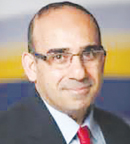
Mohamad Mohty, MD, PhD
In a retrospective registry study reported in JAMA Oncology, Mohamad Mohty, MD, PhD, of Hôpital Saint Antoine, Université Pierre et Marie Curie, and colleagues found no overall survival difference with second allogeneic hematopoietic cell transplantation (HCT) vs donor lymphocyte infusion (DLI) in patients with acute myeloid leukemia (AML) relapse.
The study involved 418 adults from the registry of the Acute Leukemia Working Party of the European Society for Blood and Marrow Transplantation who received a second allogeneic HCT (allo-HCT2; n = 137) or DLI (n = 281) for post-allograft–relapsed AML (circulating myeloblasts or ≥ 5% bone marrow infiltration). Eligible patients were those who received a first allogeneic HCT in complete remission between 1992 and 2015 for de novo or secondary AML.
The primary outcome measure was 2- and 5-year survival after allo-HCT2 or DLI. Overall, 55% of patients were male and mean age was 46 years (interquartile range = 37–57 years). For the allo-HCT2 and DLI groups, remission status at the time of intervention was complete remission 2 in 34% vs 13%, complete remission 3 in 5% vs 5%, relapse 1 in 53% vs 65%, and relapse 2 in 8% vs 17%.
Survival Outcomes
Median follow-up for surviving patients was 63 months. For the allo-HCT2 group vs the DLI group, overall survival was 26% vs 25% at 2 years and 19% vs 15% at 5 years (P = .86 overall).
Overall survival was better among patients in both groups when the procedures were offered while the patient was in complete remission (hazard ratio = 0.55, P < .001). Overall survival was poorer irrespective of treatment group among patients relapsing < 6 months after first allogeneic HCT, with 5-year overall survival of 9% in the allo-HCT2 group and 4% in the DLI group (P = .86).
The investigators concluded, “Heterogeneity of the patient-, disease-, and treatment-related characteristics limit the ability to recommend one approach over another. Findings of this study highlight that best outcomes seem to be achieved in patients relapsing 6 or more months from [first allogeneic HCT] or those in complete remission at the time of either allo-HCT2 or DLI.” ■
Kharfan-Dabaja MA, et al: JAMA Oncol. July 12, 2018 (early release online).

